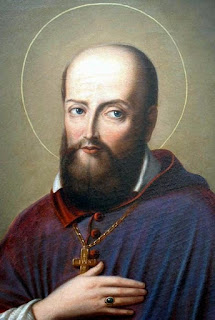Today the Church commemorates Saint Francis de Sales (1567-1622), Counter-Reformation Bishop, Doctor of the Church, Patron of Catholic Journalists and the Catholic Press, and one of the Patrons of the Paulist Fathers.
As a young convert, Isaac Hecker described Saint Francis de Sales’ writings as having “a vein of sweetness and angelic purity” [Diary, Aug 14, 1844]. Almost 30 years later, he happily reported back how he had visited Francis de Sales’ tomb and celebrated Mass there.
One of the principal themes of St Francis de Sales spirituality was the possibility of leading a holy life while immersed in worldly life and activities.
Born to noble parents in the Duchy of Savoy, he was educated to be a lawyer, but then chose the priesthood, and in 1602 became Bishop of Geneva. (Geneva, of course, was Protestant territory. So, Francis was based not in Geneva itself but in Catholic Annecy in eastern France.) Earlier, in his first sermon as Diocesan Provost, Francis had called on the cathedral canons to help him regain Geneva for the Catholic Church, but to do so by love rather than by gunpowder. He himself practiced what he preached by holding personal discussions with John Calvin’s successor in Geneva, whom Francis eventually converted. He was known for his kind disposition, humility, intellect, zeal, and fervor, all of which are on display in his most famous writings, his Introduction to the Devout Life and his Treatise on Divine Love.
When I was in High School, I was advised by a priest to read Francis’ Introduction to the Devout Life. I dutifully read it, although I doubt that I understood too much of it. I have, of course, reread it since and hopefully have gotten more out of it in later life. What was so special about Francis’ Introduction to the Devout Life was his emphasis on how everyone can live a holy life – not just those who withdraw from ordinary life in the world but those who live and work in the world, in whatever state of life or profession – what Vatican II in our own time would call the universal call of all to holiness. Noteworthy was his encouragement of frequent reception of Holy Communion. Francis saw the way to spiritual advancement in one’s desire to love God and do his will and live a life of active charity.
Francis had a naturally gentle personality, but his road to holiness did not come automatically. As a young man he went through a six-week crisis caused by a conviction he was predestined to be damned. One day he entered a Dominican church and there found Saint Bernard’s famous prayer the Memorare, which restored his peace and confidence, after which he recited that prayer every day.
Francis also devoted himself to the reform of clergy education, desirous of forming dedicated and learned priests. He called learning “the eighth sacrament.” He became Spiritual Director of Jane Frances de Chantal, who eventually founded the Institute of the Visitation, a community of religious women dedicated to prayer and the service of the sick and poor. He was also a friend to Saint Vincent de Paul, who went on to found the Vincentian Fathers and the Daughters of Charity. He mediated conflicts and was especially admired by Pope Paul V and by France’s King Henry IV.
In the Divine Office today, the Church reads from a passage in his Introduction to the Devout Life, where Francis says: God “bids Christians – the living trees of his Church – to bring forth fruits of devotion each one according to his kind and vocation. A different exercise of devotion is required of each – the noble, the artisan the servant, the prince, the maiden, and the wife; and furthermore, such practice must be modified according to the strength, the calling, and the duties of each individual. … the devotion which is true hinders nothing, but on the contrary it perfects everything.”
Homily for the Memorial of Saint Francis de Sales, Saint Paul the Apostle Church, NY, January 24, 2024.





